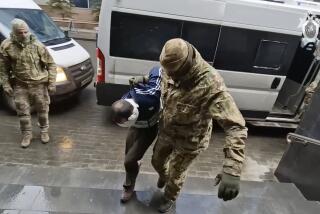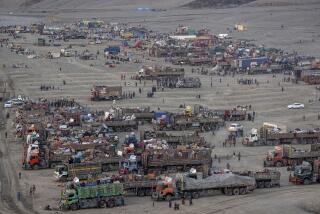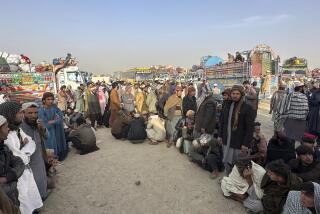CENTRAL ASIA : Tajik Refugees: Prisoners of Fear in a Foreign Land : About half of those who fled to Afghanistan to escape civil war have returned. But thousands are daunted by tales of death.
- Share via
KUNDUZ, Afghanistan — The tent is swept clean and the bedding neatly folded against the wall. Kalander Mahmadnazar sits cross-legged while his wife and daughters kneel behind a low table, covering their faces from the strangers at the door.
“It’s hard to live here in the winter,” says Mahmadnazar, a refugee from Tajikistan. “But the Communists burned our houses. We escaped because they tried to kill us. They accused us of being Muslim extremists.”
Not long ago he got a letter from home, about the new farmhouse he had built just before leaving. The letter said the roof had been stolen.
It has been a year since Mahmadnazar fled with his 13 children from the civil war in his former Soviet republic, joining an exodus of about 70,000 to Afghanistan. War has since given way to occasional skirmishes; about half the refugees have returned under a U.N. repatriation program. The rest are still in Afghanistan, held back by their leaders-in-exile or their own fears.
More than 20,000 people died in the fighting in 1992 and early 1993, when the Communist elite that ruled Tajikistan in Soviet days defeated an insurgency led by Islamic and democratic parties. Opposition leaders were imprisoned, killed or driven into exile.
After regaining control, the Russian-backed regime began repatriating refugees last April, hoping to dry up the pool of anti-government guerrillas and take the economically shattered country off a war footing. At least 18 returning refugees were killed in reprisals in the early stages. But U.N. officials now say security is good.
Refugees here, however, have been told little about the repatriation option. Asked about their plans, most mention the killings as an obstacle.
“If there is security, everyone will go,” one old man in the Kunduz camp said.
“I’ll go back when Tajikistan is free,” said Abdul Karim, a young man drawing water from a well, who came here with his wife and 4-year-old son a year ago.
Of the original 70,000 refugees in Afghanistan, 36,000 have returned to Tajikistan, 18,000 remain in a camp near Mazar-i-Sharif, 15,000 in Kunduz and 1,000 in Talokan, U.N. officials say.
Their life is harsh here in Kunduz--no electricity, telephones and other amenities they took for granted in Tajikistan. They subsist on dry bread that townspeople use for animal fodder.
The United Nations stopped giving food aid to refugees here after an attack on one of its officials a year ago. “We were told in various ways that we were not welcome,” another U.N. official said. When Tajik opposition leaders refused to let the United Nations distribute the food, its mission left.
Behind the dispute, U.N. officials say, is an effort by opposition leaders to block repatriation, which threatens to undermine their political base. These leaders maintain publicly that there are 80,000 refugees in the camps and that “only a few” have returned to Tajikistan. “We could have repatriated the lot if it hadn’t been for constant harassment,” the U.N. official said.
Opposition leaders are especially resistant because the Tajik government refuses to negotiate with them. As long as it is in power, they might never be allowed to return.
In the leafy town of Talokan sits one such leader, Sayed Abdullah Nuri, in an office furnished in the spare Afghan style. He claims that 5,000 armed fighters are under his leadership and that they control most of the Pamir mountain region of eastern Tajikistan.
While the Tajik government claims it is fighting a holy war against Islamic militants, there is little evidence in the refugee camps of fundamentalist fervor or significant military aid from Afghan moujahedeen or Arab Islamic groups. In any case, Tajik guerrillas cross clandestinely into their country from Afghanistan, skirmishing with 25,000 Tajik border troops and 15,000 Russian soldiers.
“Our struggle is for a united Tajikistan,” Nuri says, looking out at the distant snowcapped peaks of his homeland. “We want to free people from the hands of a cruel government. If it can be settled by negotiations, I’m in favor of this.”
More to Read
Sign up for Essential California
The most important California stories and recommendations in your inbox every morning.
You may occasionally receive promotional content from the Los Angeles Times.










